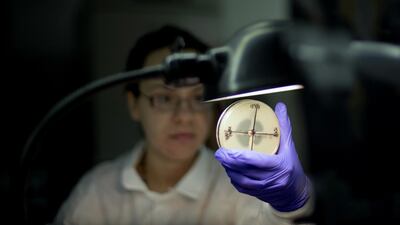Just eight new antibiotics under development are viewed as effective in fighting the rising tide of drug-resistant infections, as the world risks running out of effective antibacterial agents.
A new report into global antibacterial development shows a serious lack of new antibiotics that will add real value to the arsenal available to doctors.
The WHO report found few new treatment options for antibiotic-resistant infections identified as posing the greatest health risk.
One of those risks is drug-resistant tuberculosis, which kills around 250,000 people annually.
The report identified 51 new antibiotics and biologicals currently under development to treat tuberculosis, anti-biotic resistant pathogens and diarrhoeal infection C-difficile.
Further concerns were raised due to the lack of new oral antibiotics due to come on to the market, seen as essential for treating infections outside of medical settings or where resources are limited.
“Antimicrobial resistance is a global health emergency that will seriously jeopardise progress in modern medicine," said Dr Tedros Adhanom Ghebreyesus, the WHO director-general.
___________
Read more
Combat medics alarmed at resistance to antibiotics
The sale of prescription drugs over the counter threatens to wipe out the power of antibiotics
___________
“There is an urgent need for more investment in research and development for antibiotic-resistant infections including TB, otherwise we will be forced back to a time when people feared common infections and risked their lives from minor surgery.”
The WHO has identified 12 classes of priority pathogens that are becoming increasingly resisting to existing drugs.
Some of those pathogens cause common infections such as pneumonia or urinary tract infections which as becoming harder to treat.
The WHO said there is a growing concern about a lack of effective options for doctors to control outbreaks of potentially deadly infections of Klebsiella and E-coli, particularly in hospitals and nursing homes.
“Pharmaceutical companies and researchers must urgently focus on new antibiotics against certain types of extremely serious infections that can kill patients in a matter of days because we have no line of defence," says Dr Suzanne Hill, director of the department of essential medicines at WHO.
The WHO is also developing guidance for the responsible use of antibiotics in the human, animal and agricultural sectors, and infection prevention control.
More than €56 million (Dh246.4 million) has been pledged by Germany, Luxembourg, the Netherlands, South Africa, Switzerland, UK and the Wellcome Trust to help counter the threat.
The fund will contribute to further work by the Global Antibiotic Research and Development Partnership, set up by the WHO and the Drugs for Neglected Diseases Initiative (DNDi).
"Research for tuberculosis is seriously underfunded, with only two new antibiotics for treatment of drug-resistant tuberculosis having reached the market in over 70 years,” said Dr Mario Raviglione, director of the WHO Global Tuberculosis Programme.
“If we are to end tuberculosis, more than US$ 800 million per year is urgently needed to fund research for new anti-tuberculosis medicines.”
A pharmaco-economic forum hosted by the Ministry of Health and Prevention with leaders from the GCC is being held in Dubai On September 28-29 where drug pricing and the latest pharmaceutical developments for the region will be discussed.


